外研版(2019)选择性必修 第四册Unit 6 Space and beyond课件(共23张PPT)
文档属性
| 名称 | 外研版(2019)选择性必修 第四册Unit 6 Space and beyond课件(共23张PPT) | 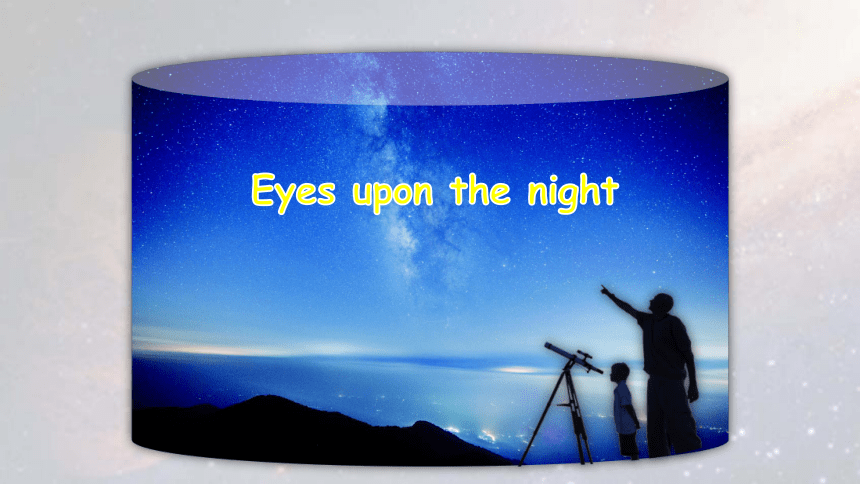 | |
| 格式 | pptx | ||
| 文件大小 | 58.9MB | ||
| 资源类型 | 教案 | ||
| 版本资源 | 外研版(2019) | ||
| 科目 | 英语 | ||
| 更新时间 | 2023-05-23 18:31:37 | ||
图片预览

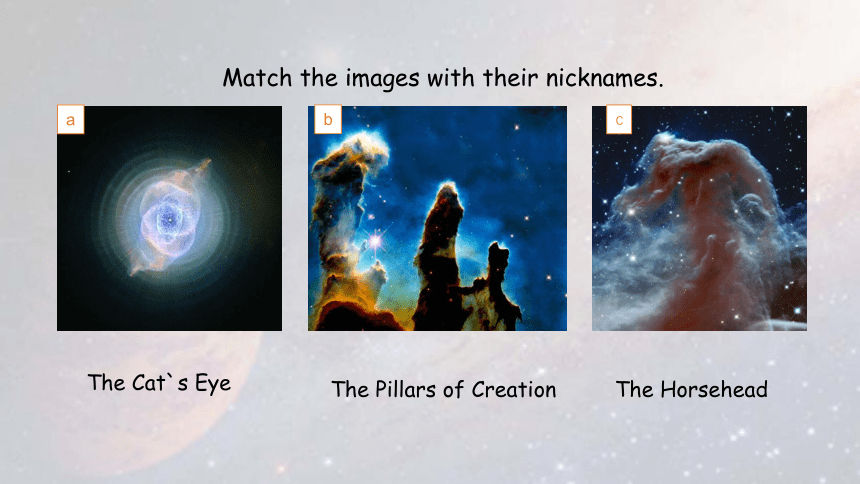
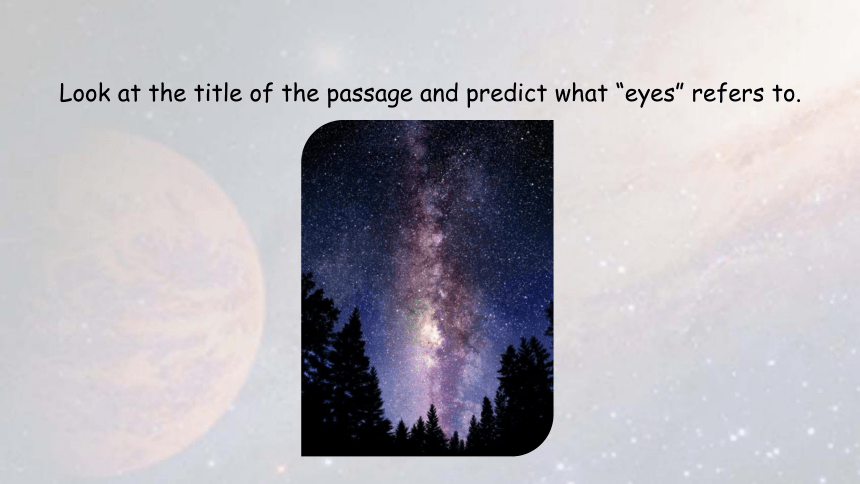
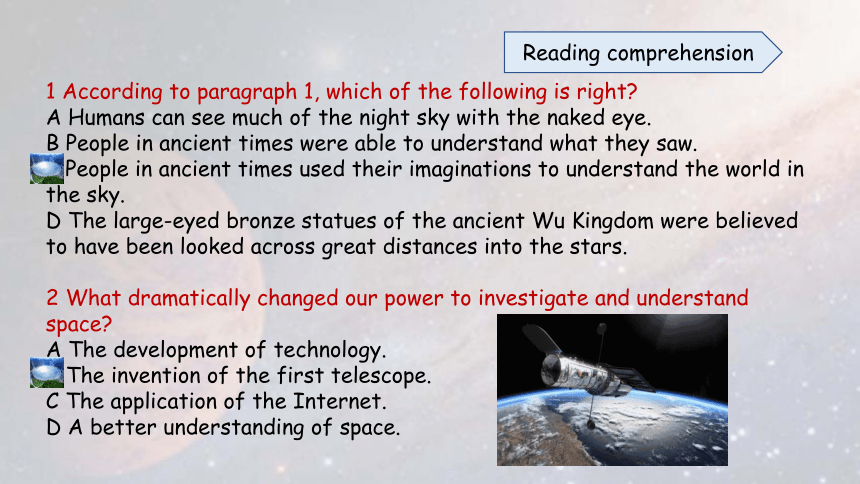
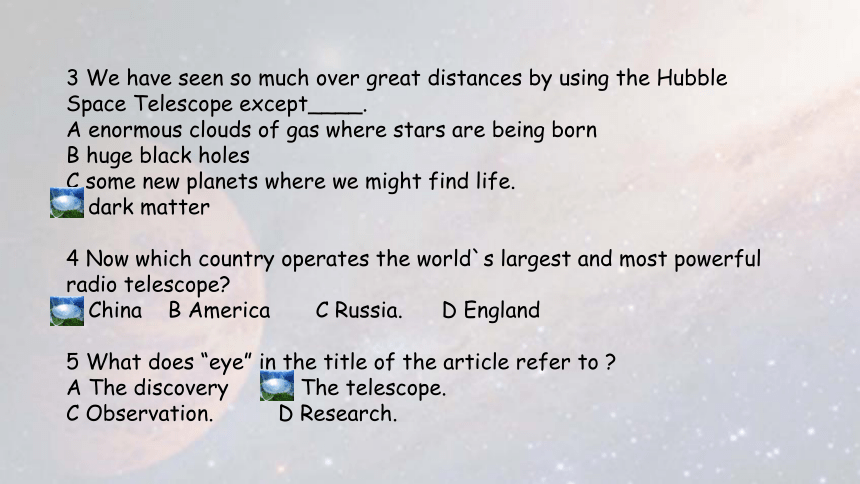
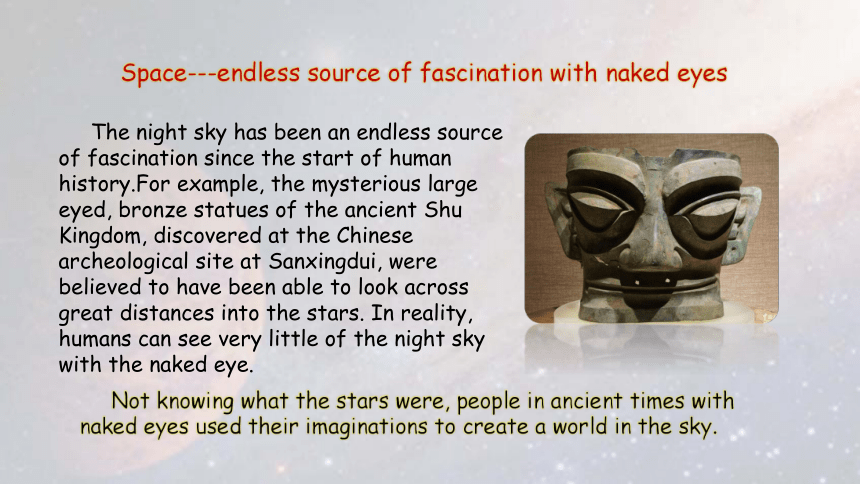
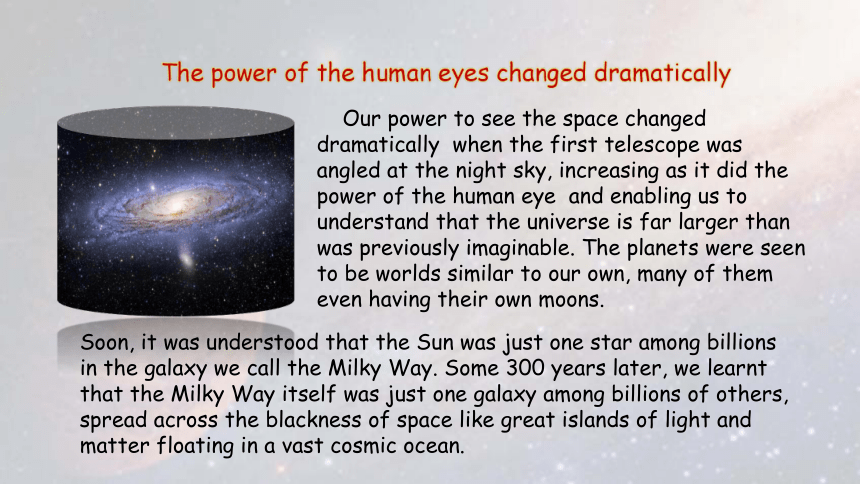
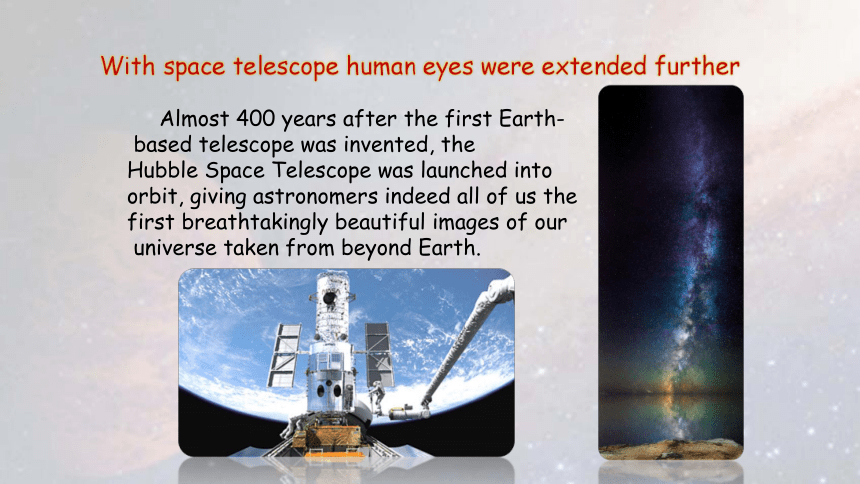
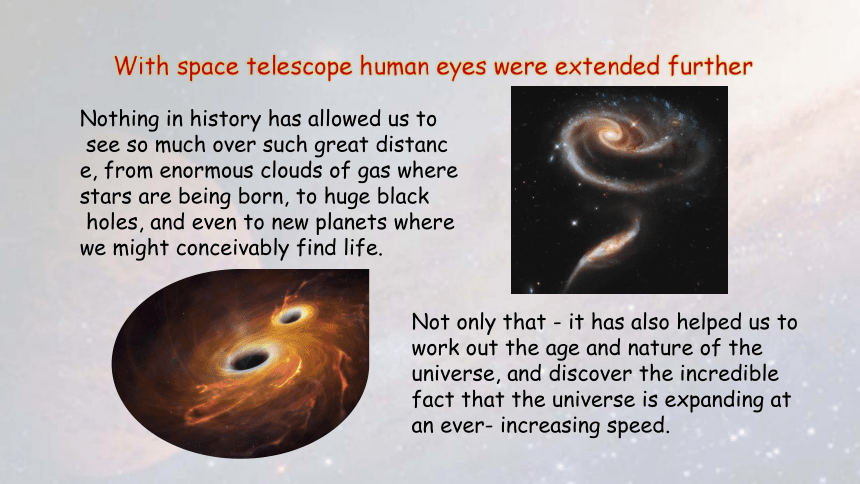
文档简介
(共23张PPT)
Eyes upon the night
Match the images with their nicknames.
a
b
c
The Cat`s Eye
The Pillars of Creation
The Horsehead
Look at the title of the passage and predict what “eyes” refers to.
1 According to paragraph 1, which of the following is right
A Humans can see much of the night sky with the naked eye.
B People in ancient times were able to understand what they saw.
C People in ancient times used their imaginations to understand the world in the sky.
D The large-eyed bronze statues of the ancient Wu Kingdom were believed to have been looked across great distances into the stars.
2 What dramatically changed our power to investigate and understand space
A The development of technology.
B The invention of the first telescope.
C The application of the Internet.
D A better understanding of space.
Reading comprehension
3 We have seen so much over great distances by using the Hubble Space Telescope except____.
A enormous clouds of gas where stars are being born
B huge black holes
C some new planets where we might find life.
D dark matter
4 Now which country operates the world`s largest and most powerful radio telescope
A China B America C Russia. D England
5 What does “eye” in the title of the article refer to
A The discovery B The telescope.
C Observation. D Research.
The night sky has been an endless source of fascination since the start of human history.For example, the mysterious large eyed, bronze statues of the ancient Shu Kingdom, discovered at the Chinese archeological site at Sanxingdui, were believed to have been able to look across great distances into the stars. In reality, humans can see very little of the night sky with the naked eye.
Space---endless source of fascination with naked eyes
Not knowing what the stars were, people in ancient times with naked eyes used their imaginations to create a world in the sky.
Our power to see the space changed dramatically when the first telescope was angled at the night sky, increasing as it did the power of the human eye and enabling us to understand that the universe is far larger than was previously imaginable. The planets were seen to be worlds similar to our own, many of them even having their own moons.
The power of the human eyes changed dramatically
Soon, it was understood that the Sun was just one star among billions in the galaxy we call the Milky Way. Some 300 years later, we learnt that the Milky Way itself was just one galaxy among billions of others, spread across the blackness of space like great islands of light and matter floating in a vast cosmic ocean.
Almost 400 years after the first Earth- based telescope was invented, the Hubble Space Telescope was launched into
orbit, giving astronomers indeed all of us the first breathtakingly beautiful images of our
universe taken from beyond Earth.
With space telescope human eyes were extended further
Nothing in history has allowed us to
see so much over such great distance, from enormous clouds of gas where
stars are being born, to huge black
holes, and even to new planets where we might conceivably find life.
With space telescope human eyes were extended further
Not only that - it has also helped us to work out the age and nature of the universe, and discover the incredible fact that the universe is expanding at an ever- increasing speed.
To see even further into the universe, many countries are now engaged in building ever more advanced telescopes. Currently, China operates the world's largest and most powerful radio telescope, the FAST telescope, completed in 2016. The 500-metre dish of the Eye of Heaven is being used in the search for dark matter, thought to be composed of subatomic particles invisible to ordinary telescopes. This vast dish also has the ability to explore regions of space billions of light years away, right at the edge of the visible universe.
The Eye of Heaven---powerful
The Hubble and the space telescopes constructed after it will allow us to see further and further into space. We will view stars and galaxies billions
of light years away and look back at a
past that was billions of years ago.
The human quest for knowledge reaches beyond
Using ever larger radio telescopes as our eyes,
we will one day be able to look back to a time in the
very early universe, before the existence of light.
But the human quest for knowledge reaches even
beyond that. So much of the universe remains unexplored that we are still close to the start of this incredible journey of discovery.
For thousands of years, people already regarded the night sky as 1____ endless source of fascination. It 2_____________(believe) that the large-eyed bronze statues from the Chinese archeological site at Sanxingdui were able to look across great distances into the stars. In 3_________(real), humans can see very little of the night sky with the naked eye. Our power 4___________( see) the sky changed dramatically when the first telescope was angled at the night sky. It extended the power of the human eye and enabled us to realise that the universe is a far 5___________(large) place than we ever imagined.
an
was believed
reality
to see
larger
直击高考
In 1990, the Hubble Space Telescope was launched into orbit, 6_________(give) astronomers the first breathtakingly beautiful images of our universe 7_______(take) from beyond Earth. These ranged from enormous clouds of gas 8________ stars are being born, to huge black holes, and even to new planets. In 2016, the FAST telescope was completed in China. It is used in the search for dark matte , 9_______ can`t be observed through an ordinary telescope. Its vast dish has the ability 10________(make) discoveries beyond our imaginations.
giving
taken
where
which
to make
Voyager 1 took a record called Sounds of Earth, which has recordings of greetings, music and sounds from Earth, as well as many photographs of our world.
Read the news report and find out what the Voyager 1 spacecraft took into space.
Presenting ideas
Think & Share
Why do you think people have always been interested in the stars
Which development in astronomy mentioned in the passage has made the greatest impression on you
Point of view
Arguments
Supporting examples
Work in groups. Give a talk about the quote.
Talk about the meaning of Humphry Davy's quote and whether you agree with it.
Organise your ideas by completing the notes.
3. Share your ideas with the class.
The more we know, the more we feel our ignorance; the more we feel how much remains unknown.
Humphry Davy
Writing a journal entry about living in space
What is the main reason why everyday tasks are less simple in space
2. Why is it important for astronauts to exercise regularly
Read the passage and answer the questions.
It’s important for astronauts to exercise regularly because with no gravity to push against, astronauts’ bones and muscles can become weak in space. Exercising regularly can help them stay fit.
Everyday tasks are less simple mainly because of the zero gravity in space.
What you did on the spacecraft
How you felt
What you enjoyed most/least
Imagine you have spent 24 hours on board a spacecraft.
Use the notes to organise your hournal entry.
Now write your journal entry.
Do further research if necessary.
Sunday 12 April
I was lucky enough to be
chosen as a visitor to the space
station! After an exciting blast
into orbit, I couldn’t wait to look
through the space station windows
into deep space! You can imagine
my disappointment when I didn’t
see many stars.
The astronauts laughed and explained to me that we were still in the sunlight, so of course we couldn’t see much, because the light was too bright. Shortly after, we passed into Earth’s shadow, and I looked out of the window to see the most amazing number of stars!
I felt very excited! This is the most unforgettable experience on the station. Soon after that, it was time for dinner.
The thing I noticed most was not the zero gravity measures for eating, but the fact that the food didn’t have much taste. And my nose felt blocked. It turns out these things are related, because in zero gravity, your face swells up more. After that, it was time to get strapped into bed. It was a bit hard to sleep in zero gravity – my arms kept floating away, and I woke up to see them right in front of my face, instead of lying on the bed like they would on Earth.
Despite even simple things being harder to do, I really enjoyed being in zero gravity, and I loved being able to float around instead of having to walk. It’s a pity my stay on the station was so short. It would have been great to stay longer and learn more about life in space!
Eyes upon
the space
Eyes upon the night
Match the images with their nicknames.
a
b
c
The Cat`s Eye
The Pillars of Creation
The Horsehead
Look at the title of the passage and predict what “eyes” refers to.
1 According to paragraph 1, which of the following is right
A Humans can see much of the night sky with the naked eye.
B People in ancient times were able to understand what they saw.
C People in ancient times used their imaginations to understand the world in the sky.
D The large-eyed bronze statues of the ancient Wu Kingdom were believed to have been looked across great distances into the stars.
2 What dramatically changed our power to investigate and understand space
A The development of technology.
B The invention of the first telescope.
C The application of the Internet.
D A better understanding of space.
Reading comprehension
3 We have seen so much over great distances by using the Hubble Space Telescope except____.
A enormous clouds of gas where stars are being born
B huge black holes
C some new planets where we might find life.
D dark matter
4 Now which country operates the world`s largest and most powerful radio telescope
A China B America C Russia. D England
5 What does “eye” in the title of the article refer to
A The discovery B The telescope.
C Observation. D Research.
The night sky has been an endless source of fascination since the start of human history.For example, the mysterious large eyed, bronze statues of the ancient Shu Kingdom, discovered at the Chinese archeological site at Sanxingdui, were believed to have been able to look across great distances into the stars. In reality, humans can see very little of the night sky with the naked eye.
Space---endless source of fascination with naked eyes
Not knowing what the stars were, people in ancient times with naked eyes used their imaginations to create a world in the sky.
Our power to see the space changed dramatically when the first telescope was angled at the night sky, increasing as it did the power of the human eye and enabling us to understand that the universe is far larger than was previously imaginable. The planets were seen to be worlds similar to our own, many of them even having their own moons.
The power of the human eyes changed dramatically
Soon, it was understood that the Sun was just one star among billions in the galaxy we call the Milky Way. Some 300 years later, we learnt that the Milky Way itself was just one galaxy among billions of others, spread across the blackness of space like great islands of light and matter floating in a vast cosmic ocean.
Almost 400 years after the first Earth- based telescope was invented, the Hubble Space Telescope was launched into
orbit, giving astronomers indeed all of us the first breathtakingly beautiful images of our
universe taken from beyond Earth.
With space telescope human eyes were extended further
Nothing in history has allowed us to
see so much over such great distance, from enormous clouds of gas where
stars are being born, to huge black
holes, and even to new planets where we might conceivably find life.
With space telescope human eyes were extended further
Not only that - it has also helped us to work out the age and nature of the universe, and discover the incredible fact that the universe is expanding at an ever- increasing speed.
To see even further into the universe, many countries are now engaged in building ever more advanced telescopes. Currently, China operates the world's largest and most powerful radio telescope, the FAST telescope, completed in 2016. The 500-metre dish of the Eye of Heaven is being used in the search for dark matter, thought to be composed of subatomic particles invisible to ordinary telescopes. This vast dish also has the ability to explore regions of space billions of light years away, right at the edge of the visible universe.
The Eye of Heaven---powerful
The Hubble and the space telescopes constructed after it will allow us to see further and further into space. We will view stars and galaxies billions
of light years away and look back at a
past that was billions of years ago.
The human quest for knowledge reaches beyond
Using ever larger radio telescopes as our eyes,
we will one day be able to look back to a time in the
very early universe, before the existence of light.
But the human quest for knowledge reaches even
beyond that. So much of the universe remains unexplored that we are still close to the start of this incredible journey of discovery.
For thousands of years, people already regarded the night sky as 1____ endless source of fascination. It 2_____________(believe) that the large-eyed bronze statues from the Chinese archeological site at Sanxingdui were able to look across great distances into the stars. In 3_________(real), humans can see very little of the night sky with the naked eye. Our power 4___________( see) the sky changed dramatically when the first telescope was angled at the night sky. It extended the power of the human eye and enabled us to realise that the universe is a far 5___________(large) place than we ever imagined.
an
was believed
reality
to see
larger
直击高考
In 1990, the Hubble Space Telescope was launched into orbit, 6_________(give) astronomers the first breathtakingly beautiful images of our universe 7_______(take) from beyond Earth. These ranged from enormous clouds of gas 8________ stars are being born, to huge black holes, and even to new planets. In 2016, the FAST telescope was completed in China. It is used in the search for dark matte , 9_______ can`t be observed through an ordinary telescope. Its vast dish has the ability 10________(make) discoveries beyond our imaginations.
giving
taken
where
which
to make
Voyager 1 took a record called Sounds of Earth, which has recordings of greetings, music and sounds from Earth, as well as many photographs of our world.
Read the news report and find out what the Voyager 1 spacecraft took into space.
Presenting ideas
Think & Share
Why do you think people have always been interested in the stars
Which development in astronomy mentioned in the passage has made the greatest impression on you
Point of view
Arguments
Supporting examples
Work in groups. Give a talk about the quote.
Talk about the meaning of Humphry Davy's quote and whether you agree with it.
Organise your ideas by completing the notes.
3. Share your ideas with the class.
The more we know, the more we feel our ignorance; the more we feel how much remains unknown.
Humphry Davy
Writing a journal entry about living in space
What is the main reason why everyday tasks are less simple in space
2. Why is it important for astronauts to exercise regularly
Read the passage and answer the questions.
It’s important for astronauts to exercise regularly because with no gravity to push against, astronauts’ bones and muscles can become weak in space. Exercising regularly can help them stay fit.
Everyday tasks are less simple mainly because of the zero gravity in space.
What you did on the spacecraft
How you felt
What you enjoyed most/least
Imagine you have spent 24 hours on board a spacecraft.
Use the notes to organise your hournal entry.
Now write your journal entry.
Do further research if necessary.
Sunday 12 April
I was lucky enough to be
chosen as a visitor to the space
station! After an exciting blast
into orbit, I couldn’t wait to look
through the space station windows
into deep space! You can imagine
my disappointment when I didn’t
see many stars.
The astronauts laughed and explained to me that we were still in the sunlight, so of course we couldn’t see much, because the light was too bright. Shortly after, we passed into Earth’s shadow, and I looked out of the window to see the most amazing number of stars!
I felt very excited! This is the most unforgettable experience on the station. Soon after that, it was time for dinner.
The thing I noticed most was not the zero gravity measures for eating, but the fact that the food didn’t have much taste. And my nose felt blocked. It turns out these things are related, because in zero gravity, your face swells up more. After that, it was time to get strapped into bed. It was a bit hard to sleep in zero gravity – my arms kept floating away, and I woke up to see them right in front of my face, instead of lying on the bed like they would on Earth.
Despite even simple things being harder to do, I really enjoyed being in zero gravity, and I loved being able to float around instead of having to walk. It’s a pity my stay on the station was so short. It would have been great to stay longer and learn more about life in space!
Eyes upon
the space
